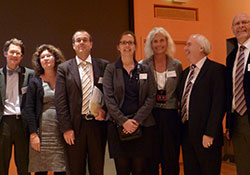Primary health care as part of integrated health service delivery, NCDs and ageing

WHO
WHO/Europe organized a workshop on 3-4 September 2012 in Gothenburg, Sweden on the theme of primary health care (PHC) as a part of integrated health service delivery – against the background of noncommunicable diseases (NCDs) and ageing.
Dr Eric de Roodenbeke, CEO of the International Hospital Federation, Dr Anna Stavdal, Vice-president, World Organization of National Colleges, Academies and Academic Associations of General Practitioners/Family Physicians (WONCA) Europe, and Prof. Paul Martin, Interim Deputy Principal of the University of the West of Scotland presented at the workshop.
The workshop took place during the biannual conference of the European Forum of Primary Care and was chaired by Dr Hans Kluge, Director, Division of Health Systems and Public Health, WHO Regional Office for Europe.
Key topics in the discussion were:
- the need to better respond to the patients needs: integration of primary and specialized care, continuum of care across all levels (demography, chronic conditions, multi-morbidities);
- integration can increase the quality of care, possibly leading to savings/cost-effectiveness;
- queries such as: Future role of hospitals? How can we overcome the segregation of levels? Is there one service model? Or do we need to tailor models?;
- the importance of addressing financial, educational and organizational barriers.
The discussion concluded that further exploration is needed on the following main issues:
- coordination of people-centered care with PHC as a hub to other services in a multidisciplinary setting
- more clarity in discussion on PHC/ gatekeeping principle
- a renewed discussion on the payment system
- research on new effective technologies that work across levels
- efforts on clinical pathways and guidelines for multi-chronic conditions across levels of care
- teamwork
- holistic approach (medical education)
- service philosophy
- community engagement
- patient empowerment
- patient rights
- sharing of academic and professional experience across European countries.



